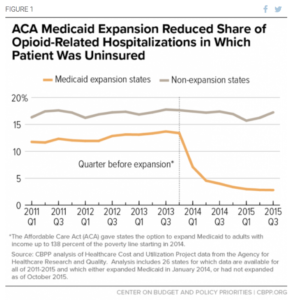“To get serious about opioids, Republicans need to stop their assault on Medicaid, quit pushing the sale of junk plans and end their relentless war on our health care,” says Leslie Dach
Washington DC – This week, President Trump and Congressional Republicans continue their campaign of deception, attempting to cloak themselves as caring about health care when instead they have waged a war on the Affordable Care Act and Medicaid. While the Trump administration claims the legislation they are signing will address the opioid epidemic sweeping the nation, their recent calls for cuts to Medicaid — which pays for one-fifth of all substance abuse treatments nationwide — and continual expansion and promotion of junk plans without substance use disorder coverage tells another story. Leslie Dach, chair of Protect Our Care, issued the following statement in response:
“Let’s be clear, President Trump and his Republicans are doing more to undermine efforts to address the opioid crisis than they doing to help those Americans who are suffering. In reality, Trump and his allies are undermining the fight against the opioid crisis by raiding Medicaid for hundreds of billions of dollars in cuts in order to pay for tax cuts for the wealthy and by making it easier for insurance companies to sell junk plans without mental health or substance use disorder treatment coverage. To get serious about opioids, Republicans need to stop their assault on Medicaid, quit pushing the sale of junk plans and end their relentless war on our health care.”
ADDITIONAL BACKGROUND
MEDICAID GIVES STATES MORE RESOURCES TO ADDRESS THE OPIOID EPIDEMIC
Medicaid Is Part Of The Solution To Curbing Opioid Epidemic. “Medicaid is the most powerful vehicle available to states to fund coverage of prevention and treatment for their residents at risk for or actively battling opioid addiction….The greatest opportunity to address this crisis is in those states that have elected to expand Medicaid, given the greater reach of the program, additional tools available, and the increased availability of federal funds.” [State Health Reform Assistance Network, July 2016]
Thanks To Medicaid Expansion, The Uninsured Rate For Opioid-Related Hospitalizations Dropped In Expansion States. “In Medicaid expansion states, the uninsured rate for opioid-related hospitalizations plummeted by 79 percent, from 13.4 percent in 2013 (the year before expansion implementation) to 2.9 percent in 2015. The decline in non-expansion states was a much more modest 5 percent, from 17.3 percent in 2013 to 16.4 percent in 2015.” [Center on Budget and Policy Priorities, 2/28/18]
Just This Week, An Associated Press Study Affirmed That “Medicaid Expansion States Had A Running Start On The Opioid Crisis.” “In states that expanded Medicaid, the insurance program already covers addiction treatment for nearly everyone who is poor and needs it. Medicaid allows states to go beyond the basics with the grant money, while non-expansion states have to fill in for basic needs with fewer dollars, said Brendan Saloner, an addiction researcher at Johns Hopkins Bloomberg School of Public Health. In effect, Medicaid expansion states had a running start on the opioid crisis, while states without the extra Medicaid funding hastened to catch up…States that did not expand Medicaid spent $2,645 per patient on opioid addiction treatment on average. Expansion states spent $1,581 per patient for treatment. States that did not expand Medicaid spent $1,170 per person served on recovery support services. Expansion states spent $446 per person served on recovery.” [Associated Press, 10/22/18]

(Center on Budget and Policy Priorities, 2/28/18)
In States Without Medicaid Expansion, Grant Funds Are Spent At A Faster Rate. An analysis of state use of opioid grant money found states that have expanded Medicaid spend the grant funds at a slower pace than non-expansion states, because Medicaid already covers addiction treatment for the low-income population, allowing the state to direct the grant money to invest in new infrastructure. Non-expansion states spent 71 percent of their grant money in the first year, compared to 59 percent spent by expansion states. [AP, 10/22/18]
Medicaid Expansion Has Improved Access To Substance Treatment Services. “Evidence also suggests that Medicaid expansion improved access to substance use treatment services more broadly. After expanding Medicaid, Kentucky experienced a 700 percent increase in Medicaid beneficiaries using substance use treatment services. Use of treatment services rose nationally as well; one study found that expanding Medicaid reduced the unmet need for substance use treatment by 18.3 percent.” [Center on Budget and Policy Priorities, 2/28/18]
Medicaid Helps Make Buprenorphine And Naloxone, Drugs Used To Treat Opioid Use Disorder, Affordable. “These data are consistent with other evidence that Medicaid expansion is improving access to care for people with opioid use and other substance use disorders. Medicaid makes medications like buprenorphine and naloxone, which are prescribed to combat opioid use disorders, affordable for beneficiaries.“ [Center on Budget and Policy Priorities, 2/28/18]
JUNK PLANS HURT PEOPLE WITH OPIOID USE DISORDER
Short-Term Junk Plans Can Refuse To Cover Essential Health Benefits, Like Mental Health Treatment. “Typical short-term policies do not cover maternity care, prescription drugs, mental health care, preventive care, and other essential benefits, and may limit coverage in other ways.” [Kaiser Family Foundation, 2/9/18]
Short-Term Plans May Exclude Coverage For Pre-Existing Conditions. “Policyholders who get sick may be investigated by the insurer to determine whether the newly-diagnosed condition could be considered pre-existing and so excluded from coverage.” [Kaiser Family Foundation, 2/9/18]
- As Many As 130 Million Nonelderly Americans Have A Pre-Existing Condition. [Center for American Progress, 4/5/17]
- One in 4 Children Would Be Impacted If Insurance Companies Could Deny Coverage Or Charge More Because Of A Pre-existing Condition. [Center for American Progress, 4/5/17]
Junk Plans Mean Higher Premiums For People With Pre-Existing Conditions. “By promoting short-term policies, the administration is making a trade-off: lower premiums and less coverage for healthy people, and higher premiums for people with preexisting conditions who need more comprehensive coverage.” [Washington Post, 5/1/18]
Under Many Short-Term Junk Plans, Benefits Are Capped At $1 Million Or Less. Short-term plans can impose lifetime and annual limits – “for example, many policies cap covered benefits at $1 million or less.” [Kaiser Family Foundation, 2/9/18]
REPUBLICANS PLEDGE TO SLASH HEALTH CARE TO PAY FOR THEIR TAX CUTS FOR THE WEALTHY:
Last week, Mitch McConnell Blamed Medicare, Medicaid and Social Security for the massive increase in the debt, calling for cuts. Senate Majority Leader Mitch McConnell blamed “bipartisan reluctance” to reform federal entitlement programs for the rising federal deficit, which the Treasury Department said Monday reached $779 billion in 2018. “There’s been a bipartisan reluctance to tackle entitlement changes because of the popularity of those programs,” McConnell told Bloomberg News. “Hopefully at some point here, we’ll get serious about this.”
Last month, Larry Kudlow, Director of the National Economic Council, confirmed that he has his sights on cutting Medicare. Asked when programs like Social Security and Medicare will be looked at for reforms, Kudlow replied, “Everyone will look at that — probably next year.”
Paul Ryan on Medicare: “It’s the biggest entitlement we’ve got to reform.” Paul Ryan, December 6, 2017: “We’re going to have to get back next year at entitlement reform, which is how you tackle the debt and the deficit…Frankly, it’s the health care entitlements that are the big drivers of our debt, so we spend more time on the health care entitlements…In- think the president is understanding that choice and competition works everywhere in health care, especially in Medicare…This has been my big thing for many, many years. I think it’s the biggest entitlement we’ve got to reform.”
President Trump and Congressional Republicans are targeting Medicare and Medicaid to pay for tax cuts for the wealthiest. Last December, President Trump signed a $1.5 trillion tax bill that disproportionately benefits the wealthy. How do Republicans plan on paying for it? Speaker Ryan’s answer is clear: “Frankly, it’s the health care entitlements that are the big drivers of our debt.” In an attempt to pay for these tax cuts, in April, House Republicans passed a budget amendment that would slash Medicare funding by $537 billion over the next decade.
Congressional Republicans proposed these cuts after passing a budget resolution last year that cut Medicare by $473 billion. The 2018 budget resolution passed by Republicans in December 2017 cut Medicare by $473 billion.
Congressional Republicans Voted to Slash An Additional $1.3 Trillion From Medicaid and other Health Care Programs. The 2018 budget resolution passed by Republicans in December 2017 cut non-Medicare health programs, most notably Medicaid, by $1.3 trillion, a 20 percent cut over the course of 10 years, increasing to a 29.3 percent cut by 2027.

